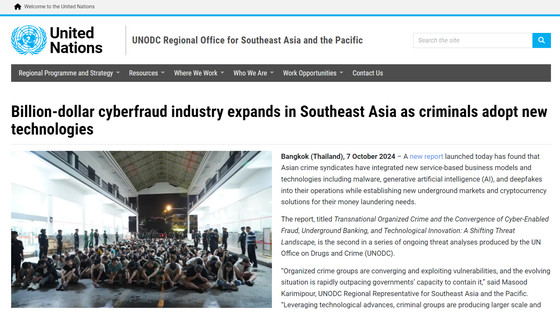A UN organization releases a report on an international cybercrime syndicate in Southeast Asia that has grown so large that the damage amount can reach up to 5.47 trillion yen

The United Nations Office on Drugs and Crime (UNODC) Southeast Asia and Pacific Regional Branch released a report on the changing threat of international organized crime in Southeast Asia. According to the report, financial losses from cyber fraud in Southeast Asia will reach up to $37 billion (approximately 5.47 trillion yen) in 2023, with deepfake-related crimes increasing by 1530%.
Billion-dollar cyberfraud industry expands in Southeast Asia as criminals adopt new technologies
https://www.unodc.org/roseap/en/2024/10/cyberfraud-industry-expands-southeast-asia/story.html

Transnational Organized Crime and the Convergence of Cyber-Enabled Fraud,Underground Banking and Technological Innovation in Southeast Asia:A Shifting Threat Landscape
(PDF file) https://www.unodc.org/roseap/uploads/documents/Publications/2024/TOC_Convergence_Report_2024.pdf
In Southeast Asia, the threat of organized crime is rapidly evolving, driven by sophisticated crime syndicates and complex networks. Cyber fraud and online gambling are on the rise, with casinos and special economic zones becoming hubs for crime. Money laundering using virtual currencies is also on the rise, with high-risk virtual asset service providers transforming countries' criminal service economies.
The report said financial losses from cyber fraud in Southeast Asia rose from $18 billion to $37 billion, with fraud cases in Singapore causing losses of S$206.5 billion in 2023.
Additionally, one high-risk virtual asset service provider is said to have processed between $49 billion (approximately 7.24 trillion yen) and $64 billion (approximately 9.46 trillion yen) worth of virtual currency transactions between 2021 and 2024.

In addition, a survey has also reported that deepfake-related crimes in the Asia-Pacific region increased by 1,530% from 2022 to 2023. In May 2024, a deepfake fraud incident occurred in which a Hong Kong engineering company suffered losses of HK$200 million (approximately 3.8 billion yen).
The encrypted messaging service Telegram has become a hotbed of organized crime in Southeast Asia, UNODC's Southeast Asia and Pacific regional office said in a report that its analysis of hundreds of Telegram channels revealed an increase in the promotion of services related to cyber fraud and money laundering.
In particular, mentions of deepfake-related content on Telegram increased by more than 600% between February and July 2024. In addition, the report states that it is also being used to distribute information stealing malware and provide the underground business 'Cloud of Logs' that sells stolen data.

'Organized crime groups are banding together to exploit vulnerabilities and the situation is evolving rapidly outpacing government efforts to contain them,' said Masoud Karimipour, UNODC Regional Director for Southeast Asia and the Pacific. 'Criminal groups are taking advantage of advances in technology to commit larger scale fraud, money laundering, underground banking and online fraud. This is creating a criminal service economy that is becoming a key testing ground for transnational criminal networks seeking to expand their influence and diversify into new business areas.'
Related Posts:
in Security, Posted by log1i_yk







